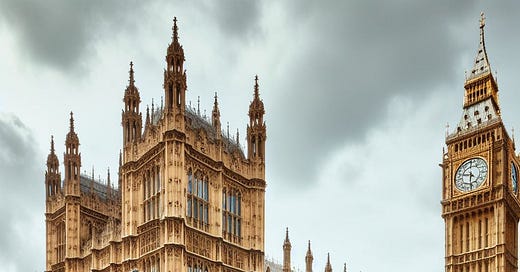What Colour Were Dinosaurs?
An Evolutionary Theory of Government. It's time to take The Sniff Test.
Black Sausages and Ginger Meatballs
When I was a child my dinosaur toys were grey or green. That was the conventional wisdom based on animals that looked like dinosaurs. The crocodile, right?
Dinosaurs, crocodiles and birds are all descended from archosaurs. These were reptiles that first appeared around 245 million years ago. We now know that crocodiles are not direct descendants of dinosaurs.
The first fossilised dinosaur feather was uncovered in 1996. These feathers contain melanosomes from the pigment that colours hair, skin, feathers and eyes in all animals. Their different shapes reveal colour: sausage-shaped for black and meatball for ginger.
Many dinosaurs were covered in feathers and were likely colourful. Our knowledge of them improves through time. It may also shed light on the workings of government.
Evolutionary Architecture
Stephen J Gould was a palaeontologist and evolutionary biologist who criticised over-zealous assumptions about adaptation. He argued that not every feature of a species is ideally suited to its environment. A lot of stuff is just there.
In The Spandrels of St. Marco Gould created a metaphor from architecture. A spandrel is the triangular space between rounded arches. They are colourfully decorated in the Cathedral Basilica of St. Marks in Venice.
The designers made the most of these spaces but their purpose is not to be decorated. They don’t have a precise purpose, but occur when arches support a dome. Gould defined evolutionary “spandrels” as features arising as necessary consequences of other features, but not chosen by natural selection. Blood is red because of the iron in haemoglobin reacting with oxygen. The colour serves no evolutionary purpose.
Evolutionary Culture
Gould believed there is no drive to bigger, faster or smarter in evolution. The goal is diversity rather than complexity. Thus biological evolution contrasts with cultural evolution, whereby society may improve through learned behaviours.
There is nothing inevitable about this, but Gould stressed the importance of differences. This was to avoid his theory being used by the politically correct to attribute equal worth to all cultures.
The philosophical argument for equal worth is that there is no absolute truth and therefore no benchmark against which to measure. We cannot know anything for certain. While this is true, The Sniff Test argues regularly for David Deutsch’s view that truth is what we know to the best of our abilities. Understanding that knowledge evolves and improves, is not to deny what is best today.
Gould mocked a strict interpretation of Richard Dawkins Selfish Gene theory as Just So stories. These explain every genetic feature in terms of evolutionary purpose. Humans have common features and individual differences, arising as different decorations on spandrels.
Variations in human DNA are what allows law enforcement to determine guilt from crime scenes. While differences arise in a number of ways, Short Tandem Repeats (STRs) are the basis of forensic profiling. These are repetitive sequences of short DNA motifs that vary in number of repeats between individuals.
DNA molecules consist of adenine (A), cytosine (C), guanine (G) and thymine (T). Short DNA motifs involve combinations such as CA or TA. These are copied, amplified and fragmented to create an equivalent of a barcode. This is compared to DNA records to link people to the crime scene.
Democratic governments also have common traits and individual differences.
A Definition of Democracy
Karl Popper defined democracy as the ability to replace government. Democracies that vary in voting systems, representation and institutions, share this feature.
The neatness of Popper’s definition is that outcome rather than process matters. A policy cannot be judged as democratic or not, because two democracies may reach different conclusions about it. Abortion is contentious and there is no policy that is superior to others. A provision is acceptable until the people vote for a change.
Democratic people cannot vote away their right to democracy. Hence constitutional amendments designed to perpetuate power are undemocratic.
The change in the Communist Party constitution ratified by the 2018 National People’s Congress in China is one example. A 2020 vote in Russia approved constitutional changes allowing Putin to remain until 2036. Turkey had a vote in 2017 that extended the period in which Erdogan could be President.
The fact that these changes were voted on is irrelevant. Democracies do not vote themselves out of existence. To do so violates the definition of a system in which the people who govern may be replaced.
An Evolutionary Theory of Government
Consider democratic government as human DNA. There are common elements and marked differences. No two governments decorate their spandrels in the same way.
Government serves two purposes. The first is to point society in a positive evolutionary direction, while the second is to address the by-products of progress.
Both Dawkins’ selfish gene and Gould’s spandrel theory allow for evolutionary outcomes that are sub-optimal for a species. They can only go so far however before correcting. Extinction events are caused by external factors to which there is no time to adapt.
In similar fashion, a democratic government need not do what is in the best interests of society. This interest may be measured by a majority opinion or an average level of welfare. When things stray too far from the expected path then the government is changed. If it cannot be, then democracy becomes extinct.
Painting Political Spandrels
In this way democracies lumber towards better outcomes for society. What constitutes better changes through time and governments react. They push an agenda only until the people pushback. The backlash against net zero policies is a recent example.
Legal changes are like mutations in the genetic code. There is a purpose to them, like the rounded arches that hold up the dome of St. Marks, and a consequence, such as the spandrels. The latter must be decorated to make the whole attractive.
It is a common belief that government should fund scientific research. Once that research finds something of commercial value then the private sector is best placed to develop it. A lot of communication technology was first researched in the military.
The UK government provides tax exemptions for spending on research and development. The startup I worked for took advantage of these. We showed we were among the first to apply the latest maths to financial markets and that it was advantageous to do this in Britain.
The government also provides tax breaks for private equity investment. The reasoning is that conventional funding markets, such as banks and stock markets, are too risk averse to experiment. Private capital that is prepared to take a risk is essential for ground breaking developments. Hence it is subsidised.
This policy points society in a positive evolutionary direction. It also has significant consequences. One is that borrowing large sums in privately funded companies, allows them to be controlled with a minority of the capital.
The results are displayed on high streets. Shops and restaurants are attractive businesses that pay suppliers slowly and collect money from customers quickly. As a result they have positive cash flow.
This cash may be used to service debt. It makes sense to keep increasing the debt until the cash generated by the business just covers the increased interest payments. But in a recession, or when interest rates rise suddenly, the calculations go awry. This has happened to a lot of high street names that are no longer with us.
It is reckless for a single business to borrow up to the gills. But for a private equity fund investing in a range of companies it makes more sense. Some win, some lose and as long as the winners are big enough, a larger number of losses are tolerated.
At some point government may choose to step in. If for example, deserted high streets are a problem, or society’s resources may be better directed. There are choices about how to proceed. The tax code may be changed, or high streets rezoned for residential buildings.
This is the stuff of the state. These are not issues that vex the electorate and bring governments down. As a consequence, ways of doing things become embedded and captured by vested interests. Private equity entrepreneurs are big political donors and “self made” candidates for office.
The Threat to Democracy
In The Handover, David Runciman explores the idea that institutions take on a life of their own and stymie democracy. While the people in corporations and the civil service change, their purpose remains. They outlive governments and in some cases populations.
It is hard to conceive of end to entitlement programmes such as free health care and education. There is always an external threat to justify continued defence spending. Add interest on government debt and there is little left to do anything new. This is one reason political parties have similar agendas.
There is an expanding administrative role of government to support entitlement programmes, defence spending and debt finance. This does not change even when those in power do. Society becomes less democratic over time as a smaller percentage of the government apparatus changes each election. At some point this boils over.
Self-Correcting Mechanisms
George Friedman argues that America has institutional and economic cycles. For the first time, both will end at the same time around 2030. Friedman expects more than the usual amount of turmoil.
The latest institutional cycle began 80 years ago after World War II. It is characterised by the rule of experts, unelected advisers who determine policy. While Trump demonstrated that advisers as well as office holders can change frequently, Friedman has another beef.
An expert has one area of specialisation. This dominates their thinking. Thus health advisers during Covid cared only to stop the spread of the disease. The social and economic consequences of lockdowns were not considered. Defence experts only concern is winning the arms race, while economic advisers have pet theories to push.
Friedman associates strains on society with this dependence on experts. He anticipates leaders emerging who are capable of weighing up conflicting advice. This is a democratic renewal because it puts the electorate in closer touch with those taking decisions.
Those of a certain age cannot imagine things being different to the way we have always known them. Our generations are not the catalyst for change. Friedman expects Millennial leaders to overthrow the old guard, potentially in the 2028 US election. Something similar may happen in the UK in 2029.
The resulting upheaval will be dramatic. Funding for entitlement programmes, defence spending and even tax subsidies for investing, may all change over a short period of years. This is the evolutionary self correction of democracy. It is what it does to avoid becoming extinct.
Government Must Adapt
Would a constitutional amendment allowing a future President Trump to remain in office be undemocratic? Yes, if it postponed the constitutional electoral cycle. What about a change that allowed him to run for office a third time?
Presidential term limits were introduced in 1947 following Franklin D. Roosevelt’s four consecutive wins. Constitutional change is hard in the US, which is why there has not been one for over 30 years. The repeal of the 22nd Amendment is a remote possibility. But it would be democratic, provided the means of removing Trump from office remained.
Democratic systems that have survived for centuries find their own means of self preservation. In the UK, the bureaucracy acts as a check on populism, as in the resistance to Brexit. Provided there remains a means to eject the rulers the system survives.
In evolution, it is not the fittest that survive but the most adaptable. The UK government will soon discover that being too comfortable in office is the opposite of adaptation.







